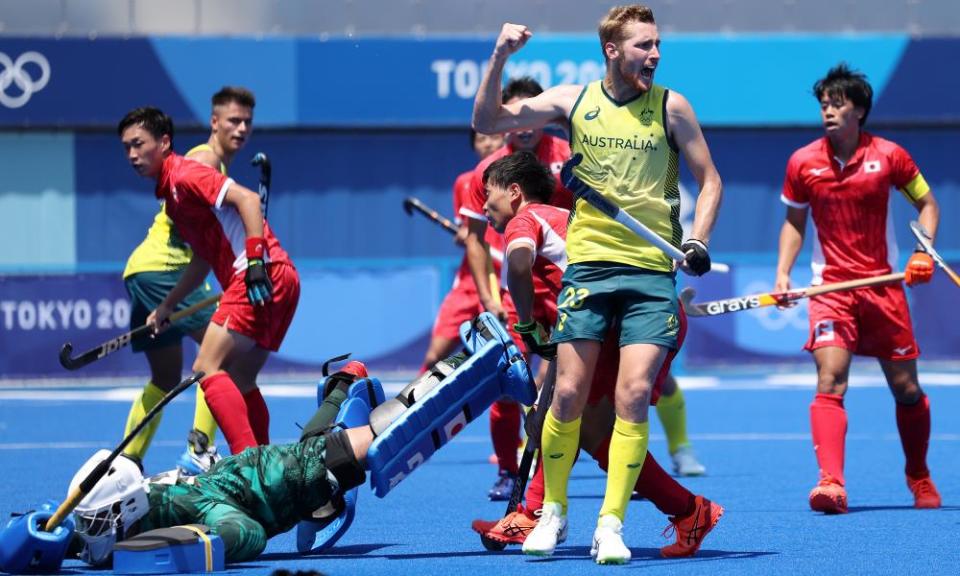Kookaburras made to sweat in Tokyo heat but do enough to shade Japan

Kookaburras coach Colin Batch says there are “lessons to be learned” after his world No 1-ranked side had to dig deep to overcome a spirited Japan in the curtain raiser for the men’s hockey tournament at Tokyo 2020.
In scorching mid-morning heat at the Oi Hockey Stadium, the hosts overcame an early deficit to enter the half-time break with the advantage. While the Kookaburras battled back to clinch victory in the second half, the tight result – against a team 14 places below them in the rankings – gave the Australians a scare heading into a tough encounter with India on Sunday.
Related: Tokyo Olympic Games 2020: men’s road race, first gold won, boxing, swimming and more – live!
“The first game of the tournament, things aren’t quite right,” said Batch afterwards. “We do have the capacity to build through the tournament – that’s what we want to do. We wanted to get off to a good start – we won the game, there’s lessons to be learned, particularly coming into India tomorrow.”
After a cagey first few minutes, Australia took the lead with two goals in quick succession. Fluid counterattacking play saw Tim Brown opening the scoring, before Tim Brand doubled the margin just before the first break.
But driven by forward Kenta Tanaka, Japan stirred into life in the second quarter with an impressive recovery. The home nation, who won the 2018 Asian Games in Jakarta, hit three unanswered goals in just five minutes. After a late, unsuccessful penalty corner, the Kookaburras walked down the tunnel at half-time looking shell-shocked. The Japanese might have had no domestic support, with thousands of empty seats looking down on them at the Covid Games, but they clearly understood the significance of the occasion.
Whatever Australia’s coach said to during the intermission had the desired effect; they stormed back into the lead in the third quarter. Blake Govers was the first to successfully convert a penalty corner, levelling the proceedings, before co-captain Zalewski found the back of the net minutes later with a sublime tomahawk shot into the top corner. After a nervous wait while German video umpire Benjamin Gontegen reviewed the goal, the video scoreboard confirmed Zalewski’s strike and the Kookaburras regained the lead. In the final quarter, Daniel Beale gave Australia some breathing room, with the encounter ultimately ending 5-3.
As the temperature hovered around 30C, with humidity compounding the oppressive heat, both teams showed signs of fatigue in the latter stages. “It’s pretty hot – we knew that, we expected that,” said Batch. The heat makes possession crucial – and the Kookaburras ended the match with almost 60% of the ball. “As long as you’ve got the ball, you can control the play,” the coach added.
The Australians have developed individualised recovery plans to help them manage the conditions, with hydration and ice baths on the agenda for the rest of the day. “The recovery is the most important part of this tournament,” said Olympic debutant Dylan Martin. “To get off the field and get hydration right, make sure you’re eating well, to ensure you’re on top of it for the back end of the tournament.”
The Kookaburras have long been a dominant force in international hockey. In the past 11 hockey world cups, dating back to 1978, they have fallen off the podium just once (finishing fourth in 1998). From Barcelona 1992 to London 2012, the Australians won six consecutive Olympic medals, including gold in Athens. But after finishing a wayward sixth at the last Games, the Kookaburras are eager to ensure that Rio is remembered as an aberration, not the new norm.
With India, Belgium, the Netherlands, Germany and Argentina all gold medal prospects in Tokyo, the Kookaburras have their work cut out in the week and a half ahead. That challenge is compounded by the Australians having played only New Zealand in the past 18 months, due to the pandemic. The Kookaburras know they cannot take their world No 1 ranking for granted, especially after a tough opening encounter with Japan.
“There are a handful of teams in the world right now that could win,” said Australia co-captain Aran Zalewski before the match. “It’s a really even competition. Given there’s been Covid as well, and we haven’t been able to train and play each as much over the past 18 months, that really throws a spanner in the works. The unpredictability of this Olympics will be a real spectacle.”

 Yahoo Movies
Yahoo Movies 